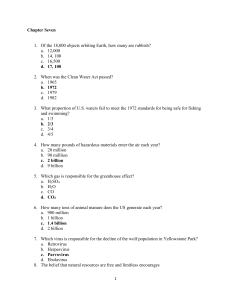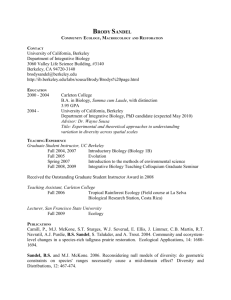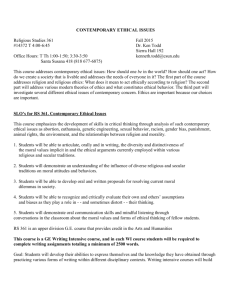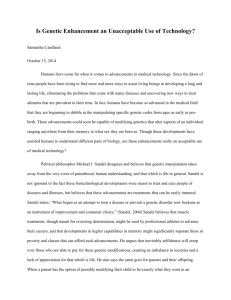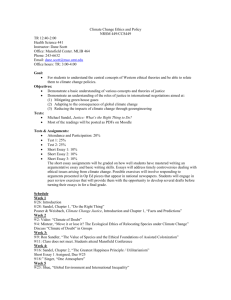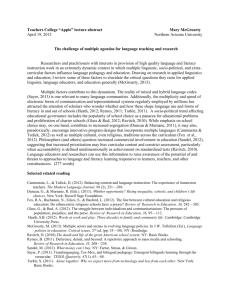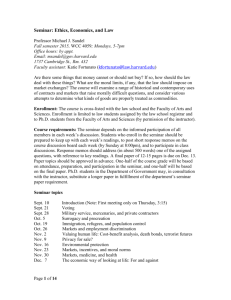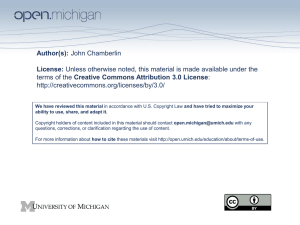On the philosophical foundations of Michael Sandel`s public
advertisement
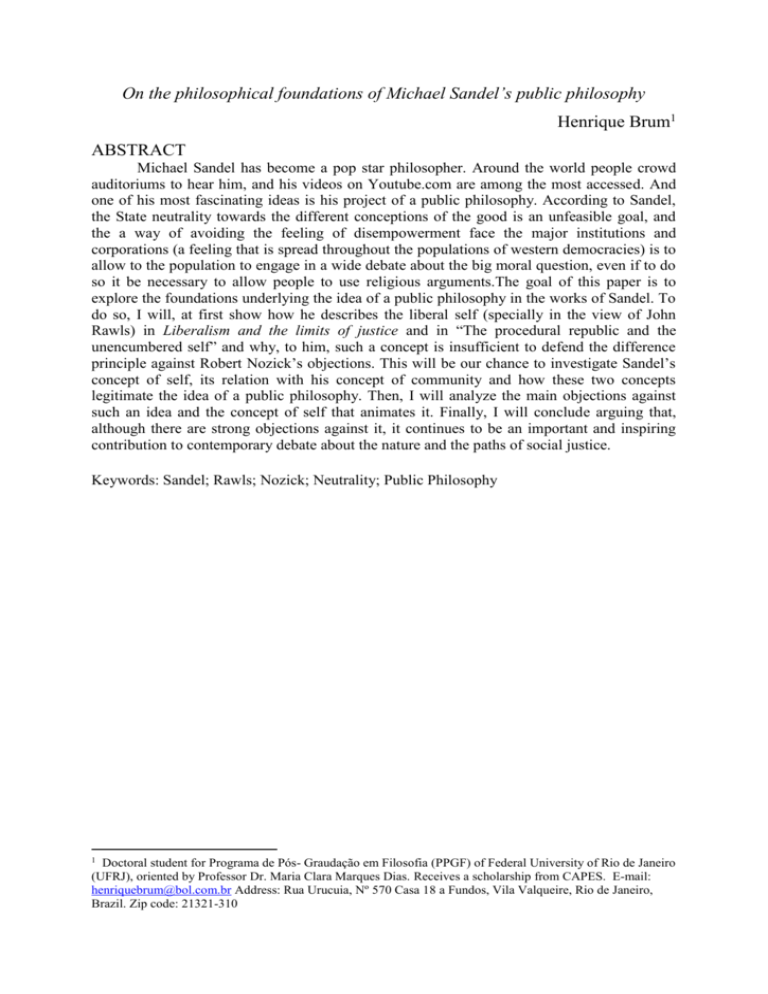
On the philosophical foundations of Michael Sandel’s public philosophy Henrique Brum1 ABSTRACT Michael Sandel has become a pop star philosopher. Around the world people crowd auditoriums to hear him, and his videos on Youtube.com are among the most accessed. And one of his most fascinating ideas is his project of a public philosophy. According to Sandel, the State neutrality towards the different conceptions of the good is an unfeasible goal, and the a way of avoiding the feeling of disempowerment face the major institutions and corporations (a feeling that is spread throughout the populations of western democracies) is to allow to the population to engage in a wide debate about the big moral question, even if to do so it be necessary to allow people to use religious arguments.The goal of this paper is to explore the foundations underlying the idea of a public philosophy in the works of Sandel. To do so, I will, at first show how he describes the liberal self (specially in the view of John Rawls) in Liberalism and the limits of justice and in “The procedural republic and the unencumbered self” and why, to him, such a concept is insufficient to defend the difference principle against Robert Nozick’s objections. This will be our chance to investigate Sandel’s concept of self, its relation with his concept of community and how these two concepts legitimate the idea of a public philosophy. Then, I will analyze the main objections against such an idea and the concept of self that animates it. Finally, I will conclude arguing that, although there are strong objections against it, it continues to be an important and inspiring contribution to contemporary debate about the nature and the paths of social justice. Keywords: Sandel; Rawls; Nozick; Neutrality; Public Philosophy 1 Doctoral student for Programa de Pós- Graudação em Filosofia (PPGF) of Federal University of Rio de Janeiro (UFRJ), oriented by Professor Dr. Maria Clara Marques Dias. Receives a scholarship from CAPES. E-mail: henriquebrum@bol.com.br Address: Rua Urucuia, Nº 570 Casa 18 a Fundos, Vila Valqueire, Rio de Janeiro, Brazil. Zip code: 21321-310 On the philosophical foundations of Michael Sandel’s public philosophy Henrique Brum2 INTRODUCTION Michael Sandel has become a pop star philosopher. Around the world people crowd auditoriums to hear him, and his videos on Youtube.com are among the most accessed. But long before becoming famous, Sandel were already one of the most prominent political philosophers nowadays, belonging to the so called “communitarian” strand of political theory. And one of his most fascinating ideas is his project of a public philosophy. According to Sandel, the State neutrality towards the different conceptions of the good is an unfeasible goal, and the a way of avoiding the feeling of disempowerment face the major institutions and corporations (a feeling that is spread throughout the populations of western democracies) is to allow to the population to engage in a wide debate about the big moral question, even if to do so it be necessary to allow people to use religious arguments. As expected liberal are not very enthusiastic about such an idea, under the argument that there is a real chance that minoritarian religious groups end up being oppressed in the process. Anyway, the discussion about to which extent is it feasible to defend the State neutrality (or if it is possible at all) is crucial in contemporary political debate. The goal of this paper is to explore the foundations underlying the idea of a public philosophy in the works of Sandel. To do so, I will, at first show how he describes the liberal self (specially in the view of John Rawls) in Liberalism and the limits of justice and in “The procedural republic and the unencumbered self” and why, to him, such a concept is insufficient to defend the difference principle against Robert Nozick’s objections. This will be our chance to investigate Sandel’s concept of self, its relation with his concept of community and how these two concepts legitimate the idea of a public philosophy. Then, I will analyze the main objections against such an idea and the concept of self that animates it. Finally, I will conclude arguing that, although there are strong objections against it, it continues to be an important and inspiring contribution to contemporary debate about the nature and the paths of social justice. 2 Doctoral student for Programa de Pós- Graudação em Filosofia (PPGF) of Federal University of Rio de Janeiro (UFRJ), oriented by Professor Dr. Maria Clara Marques Dias. Receives a scholarship from CAPES. . E-mail: henriquebrum@bol.com.br Address: Rua Urucuia, Nº 570 Casa 18 a Fundos, Vila Valqueire, Rio de Janeiro, Brazil. Zip code: 21321-310 THE RAWLSIAN SELF In liberalism and the limits of justice, Sandel starts his analysis of justice as fairness with an analysis of the rawlsian self. According to Sandel, either on the original position or in everyday life Rawls supposes an abstract agent model, in which the self is conceived as ontologically prior to his community and to his ends and independent of them , and that for a strong reason. Consider the ancient hierarquical societies. In them, the individual had, since birth, his life possibilities and his social position established by the community. All his values, goals, plans, ends, desires possible paths in life determined from the start. His life, in a certain way, were not his and the self were dissolved in social context. Viewed under this perspective, the idea of a self that was free from any bonds prior to his own choices appears in modern age as a liberating promise (SANDEL, 2005. 231-235). Take Kantian morality as an example. Kant’s transcendental self acts freely only when it can ignore all surrounding contingencies. Its personal bonds, interests, ends, and even its desire to be happy are irrelevant to its moral acting, which is only properly moral when all external influences to the self are nullified in favor of a Will which, in building and following the general formulations of the categorical imperative, establish itself as actually free, autonomous, moral (KANT, 2002. 1-79). Rawls inherited from Kant the idea of a self ontologically prior to his bounds and ends (RAWLS, 2002. 279-283). In the original position, the parts also ignore (in fact, they do not know) their ends and their contingent characteristics (values, interests, affiliations, class, race, sex…). That makes the veil of ignorance prevent arguments based on private conceptions of the good to participate in the formulation of the concept of justice, and reserving to then a later part of the political process, when people, in their everyday life, will have full opportunities to adopt, revise, or reject them, since they conform to the restrictions imposed by the principles of justice, that were already established. That is what guarantees priority of the right over the good (SANDEL, 2005. 97). On the other hand, this conception of the self also guarantees that Rawls’ principles building method to become an exercise of pure procedural justice. With no ends or values to guide the formulation of the principles of justice, there are no external parameters to assess the rightness of the result, so that, since the premises added to the procedure be correctly guided by the reflective equilibrium method, the result of the original position must be considered just. The validity of the principles is then secured. But not only the parties in the original position are regarded his way. In their political aspects, real people are regarded as having the two moral powers, including the capacity to have, formulate, evaluate and reject a conception of the good. Nevertheless, if I can choose to reject my ends, values, bonds, characteristics that were accidentally added to me over the years, so they are not essential to me. At least in my political dimension, I can be regarded as prior to all these characteristics, that are regarded as accidents that I happen to have, in opposition to a necessary core self ontologically prior to them. The idea of the “unencumbered self” is applied then not only to imaginary people in a construction procedure, but to real people in the real world (SANDEL, 2005. 181-182). In Sandel’s words: Now the unencumbered self describes first of all the way we stand toward the things we have, or want, or seek. It means there is always a distinction between the values I have and the person I am. To identify any characteristics of my aims, ambitions, desirers and so on, is always to imply some subject “me” standing behind them, at a certain distance, and the shape of this “me” must be given prior to any of the aims or attributes I bear. (SANDEL, 1984. Italics form the author.) NOZICK’S ARGUMENT Although Sandel criticizes the self theory underlying justice as fairness often and in a number of ways, I will focus here on the one related to Rawls’ defense of the difference principle against the criticisms of Robert Nozick and Nozick’s reply. According to Rawls, the parties in the original position will agree in adopting the different principle when facing the problem of the unequal distribution of talents and of the arbitrary inequalities in life opportunities and perspectives that follow from being born in different social classes (RAWLS, 2002 64-89). In other words, they agree that, since they cannot avoid arbitrariness in the natural distribution of talents and luck, they can, nevertheless, avoid their effects, benefiting the least advantaged, since that allowing some to benefit from morally arbitrary contingencies while others not would be clearly unfair. So, they agree in regarding such contingencies as common assets that must be used for the common good (specially for the least advantaged). It will be for bringing such benefits that such contingencies will reward the people who happen to have them with the best positions in the social and economical inequalities, not for any intrinsic of them or the people who happen to have them. The assessment about to reward or not a given contingency occurs now after (and not before) the definition by the institutions of which of them are relevant in each specific context, and the concept of merit is replaced by the one of “legitimate expectations” (SANDEL, 2005. 105107). From that we can see how the justification of the difference principle in tantamount of the concept of the person above described. It is because my natural talents and capabilities and my social position are regarded as contingencies that I happen to have, and not essential to my identity (what allows me to be conceived without them) that they are regarded as common assets, and I am regarded as merely an accidental depositary of them, and that is why I am allowed to benefit from them only in the name of the benefit of all, especially of the least advantaged (SANDEL, 2005. 136-137). Although Nozick criticizes in a number of ways de difference principle, one is especially important to us (NOZICK, 2011.295-299). For Nozick, from the fact that the natural talents and the social contingencies are arbitrarily distributed one cannot infer that, therefore, they belong to the society. Let us examine the argument more accurately. Rawls claimed that, once the parties in the original position concluded that it would be unfair that some people benefited from contingencies arbitrarily distributed, such a benefit would only take place if such contingencies worked for the benefit of the least advantaged, what means to say that they are from now on regarded as a common asset that belongs to the whole society. Nozick’s argument starts with the following question: What give to the parties the right to treat such contingencies like this? Suppose for a moment that I indeed do not own my abilities, my virtues of character, my social position, being instead a simple depositary of them. Even then, what give to the society the right to treat them as its assets? In other words, why (and how), from the fact that they do not belong to me, must one infer that they belong to the society? Rawls seems to face this logical step (in fact a huge jump) as natural, due to the problem that is created by doing nothing about it (that is, to allow that people benefit or suffer due to morally arbitrary contingencies). But this problem is not necessarily an injustice, since there is an alternative (libertarian) way of dealing with it. Even though they do not belong to me, why not simply leave them where they are, allowing their depositaries to benefit from them as it pleases them, just the same way we allow to someone who finds a rough diamond besides the road to keep it? If they do not belong to me, they do not belong to no one else either, so that the natural solution seems to be simply not doing anything, especially if we consider that no entity (“the society”, “the basic structure”…) own them either, so that if such to entities is given the right to dispose of them as it pleases them (in our case, “to benefit the least advantaged”) without a good reason to do so, it seems that I am used as a means to the satisfaction of the common good, exactly what justice as fairness sought to avoid. We can see how deep this criticism cuts. It was exactly the idea that my abilities and my social position contingent features of mine (that are beyond the core of my self) that allowed Rawls to consider me as a mere depositary of them, what in turn allowed the society to use them for the common good without using me as a means. Nevertheless, if I am not their owner, society is not either, so that consider them a common asset demands a justification that Rawls, sadly, never provides. The idea of the unencumbered self that inspires the argument in the end is in the end unable to provide a good defense against the libertarian objection, leaving not only the difference principle, but all the rawlsian project of a redistributive State, with serious problems. SANDEL’S COMMUNITY For Sandel, the only way to save the difference principle is to give up the unencumbered self. Although being based on this kind of self, such a principle is not protected by it from the libertarian objection. To do so, it is necessary to provide a reason that explain why my talents and social position should be regarded as common assets (SANDEL, 2005. 143-144). And such a reason is provided when we recollect what started the arbitrariness argument. According to Rawls, I do not deserve my abilities and my social position, not only due to the fact that they are distributed unequally and arbitrarily, but also because even the initiative of developing them is derived from the systems of social values that the society inculcated in me (to use my parent’s money in my education and not to buy drugs, for instance, or to develop my skills to be a good scholar), besides the fact that valuable abilities are only valuable because that specific society considers them as so (eloquent people in a society of hunters are less valued then strong ones, while in a society it is the opposite). But if this value system was inculcated in me by society, if it was it that gave birth, allowed the existence of and nourished this abilities from the start, we can finally say that it do have the prerogative of considering them as common assets (SANDEL, 2005. 195-195). The objection, though, that to do so is to use the individual as a means to the ends of others cannot be adequately answered unless we make the self wider. That is so because what differentiates the ends of others from common ends is the fact that the latter are also my ends. But that will only occur if we can regard the self being constituted also by its ends, values and bonds, and not just the empty core of the rawlsian self. In fact, in doing so we can see how this approach turns the self into a richer and wider one, and describes more accurately ours everyday moral experience. I cannot be considered anymore as an independent person that happened to be born in this family, in this community, with these values. All this now is regarded as constitutive, as a part of me. But if my values ends and bonds constitute me, and if they exist in and are nourished by the society in which I am, that means to say I am constituted, or at least a part of me, by this society. In fact, term “society” itself is now inaccurate, once, since we make the self larger to this far, we already crossed the line between a society and a community in the constitutive sense, used by Sandel. In this sense, people in a community indeed share common aspects of their identities, and I cannot leave my community without stop being, in a certain way, myself (SANDEL, 2005. 199-206; 228-229). This new concepts of self and community have moral and epistemological consequences for our debate. In my continuing process of self-knowledge, I can often ask for help for people that are bonded to me, and that may discover aspects of my identity that were hidden from me. Nevertheless, the multitude o communities in which take part 3, and the unique way I move through all of them make me a singular being. The line between the self and the community, though is now thinner than ever, still holds. I can describe myself as belonging do different communities, assess my participation in them, face them critically and, in extreme cases, even refuse or reject them, tough now, comparing this formulation of self with Rawls’, it is (as in fact is) a much more painful process. That is what avoids the frontiers between the self and the community to collapse, what would in turn drive us back to a radically situated self, with no control over its life narrative4. Now we can see that Sandel finally has all the conditions to adress the libertarian objection. The community is entitled to the right of considerate my abilities a common asset because it allowed and nourished their development from the beginning, often to the expense of others. And that is not to use me as a means because the ends which these abilities will help to reach are my ends, ands of a community that generated me and constitutes me, and in reference to which I cannot define myself, even if I am a single individual. I may be not the owner of my abilities, but neither are its depositary. I am for them more like a guardian, in the name of a community in which I am inserted. Nozick’s objection is then addressed, saving in the process not only the difference principle, but the entire project of a redistributive State, even at the cost of the unencumbered self. 3 This is later, specified by the notion, of concentric circles of communitarian bonds, weaker at every wider circle, which start with my family and extend until reach the whole mankind (SANDEL, 1996. 338-351). 4 I use this concept on purpose, since Sandel’s conception of self is very similar to MacIntyre’s narrative conception of the person (MACINTYRE, 2001. 343-378). COMMUNITY AND PUBLIC PHILOSOPHY These very observations, tough, grant the possibility and the legitimacy of a public philosophy. Just as society has generated and nourished my abilities, it has made the same with my ends and values. We can, therefore, consider the social ends and values as common assets. And just as it is necessary to debate, including in the realm of the State, how articulate the abilities to achieve common good, the Estate also must debate which kinds of values and ends, considered as common assets, must be stimulated do thrive in a given community, with its particular history. Of course, in this conception of the person, my ends and values define me in a much more profound way, the reason for which they cannot be simply imposed to me (not, at least, without destroying the now thin line separating the self and the community). But the community could indeed bring the debate about values and ends to the realm of the State, regarded now also as a forum of construction and propagation of common values. It is exactly this idea of a debate, in the society and int the State, about common ends and values that constitutes the core of Sandel’s project of a public philosophy. That is what allow him to stimulate the participation of the people in the big moral questions of the nation, and in doing so to allow that people use religious and moral doctrines express their ends and values. Because, in the end, this big moral debate is all about values and ends. POSSIBLE OBJECTIONS Inspiring as it is, though, the idea of a public philosophy and the self theory underlying it raise many objections, from which I will three (the most serious ones for me). The fist one has an eminently practical aspect, while the other two are mainly theoretical. Oppressive communities The first one is about the fear the propagation of Sandel’s, self theory could make more difficult for people to leave potentially oppressive communities. We often hear, for instance, stories about people who abandoned fundamentalist religious sects where they were raises since childhood, and how hard it was for them the readapt for life outside such communities. The idea of an unencumbered self, prior to its bonds, which is socially widespread in the West, allow us to regard ourselves as independent of our social bonds. It was it what, partly, allowed then to conceive themselves outside those communities and how independent of them. This is one of the great qualities of this concept. But if the idea os a self like Sandel’s became socially widespread, wouldn’t it make much more difficult those people’s liberation? Wouldn’t it, in practice, fuel the oppressive aspects, not laudable at all, of the communal life? Sandel could argue that the keep of a line, fragile as now it is, between the self and the community, allows self still to consider it critically and even abandon it. Besides, he could argue, as his conception translates in a more accurate way our everyday moral experience (in which leaving a c community is much more painful than a simple choice among contingent ends), it gives to the person who want to liberate itself from her community a more realistic perspective about what goes ahead, what in the end turns to aid her to endeavor the task. But how many of them will never do it fearing the suffering caused by it, believing such a degree of oppressions is common to all the communities, or simply believing that oppression is a small price to pay for communal life (at least the only one they know)? The need for an expanded self This objection, a more theoretical one, is about to what extent it is necessary to abandon the unencumbered self to defend the difference principle (or any other distributive principle). The first part of Sandel’s argument, he argues that society has the right to consider natural abilities and arbitrariness of social birth as common assets due to the fact that it allows and nourishes their flourishing. This objector, tehn, woud ask: “Why not stopping here? We can continue to regard the self as naked from his contingent features, since it is still regarded as a mere depositary of such contingencies. And thecnically, we can affirm that we are not using it as a means, since what we use from him (the benefits from such contingencies) is not ‘him’, but a contingent feature of it.” The problem with this intermediate solution, though seems to be not as much in its concept of self as in its concept of community. In other words: What looks like a community of persons above described? If the selves are still regarded as unencumbered, if their ends, values and bonds are still regarded as merely accidental, the concept of community is radically transformed, if it survives at all. Since the ends of individuals are now regarded as being chosen by them, and not as defining them, community is not anymore regarded as constitutive of them, and is from now on regarded merely as “private society”, as a group of heterogeneous individuals that seek to achieve their interests. The problem here is that, since that the individual has the same values of the community is regarded merely as a coincidence, when it was the case that individual’s and community’s ends do not concur, the former could, in principle, simply to choose to leave such community, not being disturbed by it anymore. And if he was forced to cooperate with communal ends (that in this sense are merely the ends of the individuals who happen to form it), which were not his, he would be being used as a means for the benefit of others (that only accidentally form the common good). As we can see, the constitutive sense of community, and the self theory which animates it, is necessary for the argument to hold. Pluralism and coercion The third objection, tough theoretical, may have important practical consequences. According to it, the idea of a common realm of shared values and ends above which one can debate big moral questions describes well relatively homogeneous societies. But it is far from being the situation of large western democracies, in which reigns a complete (and complex) pluralism of values nowadays. In these cases, is it possible to talk about a common realm of shared values and ends? E, if don’t (as it seems to be the case), how to put into practice a public philosophy so that the different parties can even understand each other? A seductive solution would be to use the ends and values of the majority, but against that Rawls has a striking argument (RAWLS, 2005. 133-137). In pluralist societies, Rawls argues, there is a multitude of reasonable comprehensive doctrine, so that using the State’s coercive apparatus based in a given comprehensive doctrine is to coerce people without giving them reason that they could reasonably accept, and that is unfair. Facing this argument, wouldn’t it be much better to give up the idea of a public philosophy and adopt more modest concepts, like public reason and overlapping consensus, that are still on the realm of the neutral State, especially after the proviso added to public reason in Rawls’ last works (RAWLS, 2007)5? Sandel answers that often the debate about moral questions is inevitable (SANDEL, 2012a. 321314)(he gives the abortion and the stem cells research examples) and, even when it is, it may be undesirable to do so (SANDEL, 2012a. 314-321)(he the gay marriage example), but the doubt remains about if it is possible to endeavor such task without risking to oppress minoritarian groups. No doubt, this is the strongest objection against Sandel’s project, and its resolution remains open in contemporary debate. CONCLUSION 5 One can raise the objection that the ultimate forum of public reason is the Supreme Court, not a social debate. But Rawls never hid his wish that public reason guided all aspects of the State’s decision making process, what would include a social debate about the State’s measures (RAWLS, 2005. 215). Remember that Sandel does not wish only that people debate about what the State is doing. He wants also they do about what it should do, and that the conclusions of this debate inform and guide the State’s decision making. An institution like would by far fit in the prerequisites for being constrained by public reason. Consider, for instance, that the first target of Sandel’s political debate after he became worldwide famous is the role of markets in social life, a theme that for being implemented would demand heavy State interventions in economy (SANDEL, 2012b. 9-20) For sure, the idea of a public philosophy is far from being immune to criticisms, but at the same time it proposes us a challenge. As Sandel tells us (SANDEL,2012a. 296-297), in a time that conservative groups consider themselves the only source of moral guidance in political debate, wouldn’t it be interesting that liberals entered this dispute and defeated conservatives in their own game? Wouldn’t a wide moral debate involving us in our most profound moral bonds help dissolving prejudices put into contact rival groups that seldom debate nowadays? Of course, to do so in a way that adherents of different conceptions of the good even understand each other is already a challenge, and the shadow of minority oppression seems to be always in the next corner. Nevertheless, Sandel’s project is still an important contribution for the definition of the nature and the paths of social justice. REFERENCES KANT, I. “Groundwork for the Metaphysics of morals”, translation od Allan Wood in Wood (Ed.). Groundwork for the Metaphysics of morals. New Haven and London: Yale University Press, 2002. MACINTYRE, A. Depois da virtude (After Virtue). Translation of Jussara Simões. Bauru: EDUSC, 2001. NOZICK, R. Anarquia, Estado e utopia. Translation of Fernando Santos. São Paulo: Martins Fontes, 2011. RAWLS, J. “A ideia de razão pública revisitada”. Tradução de Denilson Luis Werle e Rurion Soares Melo in WERLE, D. L. e MELO, R. S. (Org.).Democracia Deliberativa. São Paulo: Editora Singular, Esfera Pública, 2007. Pp. 145-192. ________. 2005. Political Liberalism: Expanded Edition. New York: Columbia University Press. ________. 2002. Uma Teoria da Justiça. Translation of Almiro Pisetta e Lenita Maria Rímoli Esteves. São Paulo: Martins Fontes. SANDEL, M. Democracy’s discontent. America in search of a public philosophy. Cambridge (Mass.)/London: The Belknap press of Harvard University Press, 1996. _________. Justiça. O que é fazer a coisa certa. Translation of Heloísa Matias e Maria Alice Máximo. Rio de Janeiro: Civilização Brasileira, 2012. _________. O liberalismo e os limites da justiça. Translation of Carlos E. Pacheco do Amaral. Lisboa: Fundação Calouste Gulbenkian, 2005. _________. O que o dinheiro não compra. Os limites morais do mercado. Translation of Clóvis Marques. Rio de Janeiro: Civilização Brasileira, 2012. _________. “The procedural republic and the unencumbered self”. Political Theory. Vol. XII Nº1, 1984. P. 81-96.
